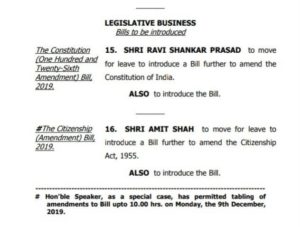India & World UpdatesAnalyticsBreaking News
Amid fear of opposition uproar, Amit Shah to table citizenship bill in Lok Sabha on Monday

December 8: Amid looming fear of Opposition uproar, the contentious Citizenship (Amendment) Bill (CAB), 2019, is to be introduced in the Lok Sabha by the Union Home Minister Amit Shah on Monday. The CAB got Union Cabinet’s nod on 4 December, 2019.
 The National Democratic Alliance (NDA) is in a minority in the Upper House, but enjoys a huge majority in the Lower House. Chances are ripe for a confrontation between the NDA and the Congress-led Opposition. The NDA will need the support of at least 123 Members of Parliament in the 245-member Rajya Sabha for a smooth passage for the bill. So far, it has the support of 105 MPs.
The National Democratic Alliance (NDA) is in a minority in the Upper House, but enjoys a huge majority in the Lower House. Chances are ripe for a confrontation between the NDA and the Congress-led Opposition. The NDA will need the support of at least 123 Members of Parliament in the 245-member Rajya Sabha for a smooth passage for the bill. So far, it has the support of 105 MPs.
 BJP is keen to pass the bill, but it has to reach out to its allies and like-minded parties to have a smooth passage in the Rajya Sabha, where the NDA is in a minority.Senior ministers, however, claim that at least 122 MPs in the Upper House support the bill. Thus, both BJP and Congress along with other political parties are busy getting their arithmetic correct before the bill goes to Rajya Sabha.
BJP is keen to pass the bill, but it has to reach out to its allies and like-minded parties to have a smooth passage in the Rajya Sabha, where the NDA is in a minority.Senior ministers, however, claim that at least 122 MPs in the Upper House support the bill. Thus, both BJP and Congress along with other political parties are busy getting their arithmetic correct before the bill goes to Rajya Sabha.
 The Lok Sabha Speaker has allowed the members to submit amendments to the Bill till 10 a.m. on 9 December. A copy of the Bill was circulated to all parliamentarians last week, after the Cabinet gave a go-ahead on 4 December. If the Bill is passed, it will be the first time that citizenship will be provided on the basis of religion.
The Lok Sabha Speaker has allowed the members to submit amendments to the Bill till 10 a.m. on 9 December. A copy of the Bill was circulated to all parliamentarians last week, after the Cabinet gave a go-ahead on 4 December. If the Bill is passed, it will be the first time that citizenship will be provided on the basis of religion.
 The Bill reduces the mandatory requirement of continuous stay in India from 12 years to five years for “many persons of Indian origin including persons belonging to the minority community from the neighbouring countries” who are unable to produce proof of their Indian origin and are forced to apply for citizenship by naturalisation under Section 6 of the Citizenship Act, 1955.
The Bill reduces the mandatory requirement of continuous stay in India from 12 years to five years for “many persons of Indian origin including persons belonging to the minority community from the neighbouring countries” who are unable to produce proof of their Indian origin and are forced to apply for citizenship by naturalisation under Section 6 of the Citizenship Act, 1955.
 The citizenship amendment bill aims to provide citizenship to those who were forced to seek shelter in India without valid travel documents because of religious persecution or fear of persecution in their home countries—primarily Hindus, Sikhs, Jains, Buddhists, Parsis and Christians from Afghanistan, Pakistan and Bangladesh. The bill thus amends the 1955 Act to grant exemptions to illegal migrants from these communities, who reached India on or before December 2014.
The citizenship amendment bill aims to provide citizenship to those who were forced to seek shelter in India without valid travel documents because of religious persecution or fear of persecution in their home countries—primarily Hindus, Sikhs, Jains, Buddhists, Parsis and Christians from Afghanistan, Pakistan and Bangladesh. The bill thus amends the 1955 Act to grant exemptions to illegal migrants from these communities, who reached India on or before December 2014.


